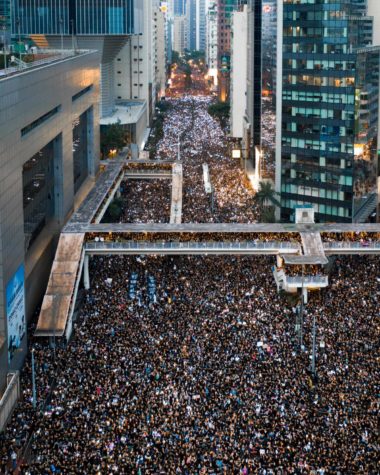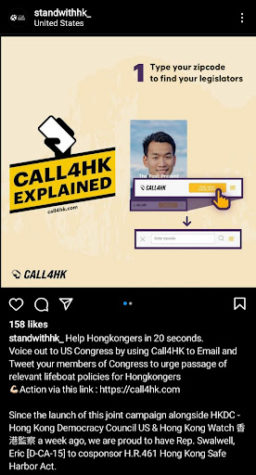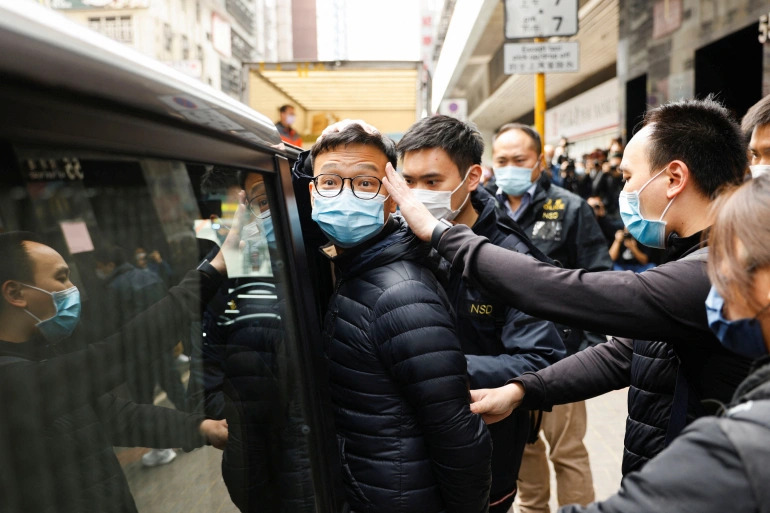The Latest Battle for Democracy: Hong Kong
Stand News, one of the last pro-democracy, independent media organizations, has shut down after a recent raid by police in Hong Kong — the most recent signal of Hong Kong’s deteriorating two party system and transition to a police state.
Patrick Lam, the Stand News acting chief editor, was one of the seven Stand News workers escorted by the police after his arrest on December 29, 2021.
July 1, 1997: Under the Sino-British Joint Declaration, Hong Kong is handed back to the Chinese authority after more than 150 years of British control.
June 30, 2020: The Standing Committee of the National People’s Congress of the People’s Republic of China passes the National Security Law (NSL) in Hong Kong. It serves as a legal framework to assert direct control over Hong Kong under the act of confronting “national security threats.”
December 16, 2020: The Hong Kong government mandates existing civil servants to swear a new pledge of allegiance or risk losing their jobs.
May 10, 2021: The Leisure and Cultural Services Department orders public libraries to remove nine books written by six pro-democracy figures and critics of Beijing to avoid violating the NSL.
Two days before the start of 2022, Stand News — one of Hong Kong’s few pro-democracy and independent media organization s— was raided by over 200 police, resulting in 7 arrests of current and former employees. “Because of the situation,” according to a post on the organization’s Facebook page, “Stand News is ceasing operations immediately.” The three men and four women arrested are between 34 and 73 years old, including Canadian pop star and pro-democracy icon Denise Ho. Her arrest is a direct violation of the Sino-British Joint Declaration as it is a mistreatment of a Canadian citizen.
A few days later, Citizen News, another independent news website, announced it would cease operations starting on January 4, 2022. The organization’s reason for shutting down? A “deteriorating media environment.” On a Facebook post on January 2nd, 2022, the organization wrote, “Regrettably, what was ahead of us [was] not just pouring rains or blowing winds, but hurricanes and tsunamis . . . Sadly, we can no longer strive to turn our beliefs into reality without fear . . .”
Earlier in the year, Apple Daily, a pro-democracy outlet known for being a critic of Hong Kong and Chinese leadership, was also forced to close down after a raid. Soon after, Apple Daily’s assets were frozen and executives were detained. Its owner, Jimmy Lai, was incarcerated. Stand News had stopped accepting donations after Apple Daily’s shutdown, claiming that they did not want to accept funds in case they were forced to shut down as well.
Dr. David Zweig, a China expert who helps decision makers understand Chinese politics and foreign relations, has spent 15 years as Director of the Center on China’s Transnational Relations at Hong Kong UST. Though he does not know how the closure of Stand News and Citizen News has affected the citizens of Hong Kong, he said, “the big blow to freedom of press came with the closing of Apple News, which was extremely widely read among the ‘masses’ of Hong Kong people, as it was the only free newspaper in the territory in Chinese.”
Established at the end of World War II by leading democratic allies, the “rules-based international order” is a shared commitment by over 120 countries to follow specific rules developed over time. Governed by the United Nations, this agreement includes shared international law, security arrangements, trade agreements, and immigration protocols. Despite being one of the charter members of the UN, China has repeatedly failed to uphold the rules-based system. This can be evidently seen in Hong Kong where, specifically under the leadership of President Xi Jinping, the Chinese Communist Party (CCP) has continuously violated international treaties and subverted democratic institutions, as well as human rights.

Since 2019, a rapidly increasing number of protests have swept through Hong Kong in response to the proposed extradition bill that would have allowed extradition of fugitives to mainland China. The biggest concern was that Beijing would use the bill to prosecute people for political reasons under China’s obscure legal system. Though Hong Kong is a city within China, it is semi-autonomous, has its own legal and political systems, and has protected special freedoms of press, speech, and assembly. Hong Kong also has its own currency, language, legal system, and culture despite being a part of China — a unique mode of governance called “one country, two systems.” Extradition protesters were especially worried that the bill would impinge on Hong Kong’s political flexibility and freedoms.
Although the bill was withdrawn, nearly a year later, the establishment of the National Security Law hit Hong Kong like a wave. The NSL outlawed democratic activism, organizations, and speeches in hopes that the pro-democracy sentiment does not creep out of Hong Kong and into the mainland. As the second largest monetary contributor to the UN, China also hopes to prevent the advancement of a democratic world order and the spread of democratic norms through its growing influence over several of the UN’s specialized agencies which includes Food and Agriculture Organization (FAO), the International Telecommunication Union (ITU), the United Nations Industrial Development Organization (UNIDP), and the International Civil Aviation Organization (ICAO).
The law reduces Hong Kong’s judicial autonomy as it directly opposes the basic laws under which the city was formed. Hong Kong’s freedom of speech, press, and publication are protected under Article 27 of the Hong Kong Basic Law and Article 16 of the Hong Kong Bill of Rights.
“The Hong Kong government justifies the suppression of this aspect of free speech, arguing that in this way seditious speech cannot become public,” explained Dr. Zweig when asked if the Hong Kong authorities have fought against the violations of these basic laws.
Adding onto how the Hong Kong government approaches politics with China, Dr. Zweig said, “Before NSL, it ‘listened’ to Beijing’s opinions, but now it ‘obeys’ Beijing.” Dr. Zweig also believes that the relations varied throughout history depending on who the Chief Executive of Hong Kong is and who the President of China is. “Xi Jinping has been much tougher than the two leaders before him, but then again, he faced much greater pressure with the 2019 protests,” said Dr. Zweig.
The details of the NSL’s 66 articles were kept secret until after it was passed. Only a handful of people had seen the full text of the law, excluding Hong Kong’s Chief Executive, Carrie Lam. The NSL criminalizes any act of secession, subversion, terrorism, and collusion with foreign or external forces. Consequently, lobbying foreign governments to help Hong Kong’s cause can become a crime in the future. Breaking these laws are punishable by a maximum sentence of life in prison. Hong Kong will have to establish its own national security commission to enforce the laws under a Beijing-appointed adviser. Beijing has the power to dictate how the law should be interpreted, and the law also applies to non-permanent residents and people from outside Hong Kong.
The legislation not only expands the Chinese police’s abilities to search without warrants, but also gives China the power to monitor and censor Hong Kong’s internet. Protesters risk arrests and anyone deemed “unpatriotic” is barred by the Chinese government from standing for election to Hong Kong’s legislature. This reduces the number of representatives who can be directly elected by the public.
The 7th Legislative Council of Hong Kong held their election on December 19, 2021 for the Popularly termed as the first “patriots only” election, it witnessed a record low voter turnout after the Beijing-imposed electoral overhaul of the city’s existing electoral system. The electoral changes were initiated by the National People’s Congress (NPC) in March 2021 to “amend electoral rules and improve the electoral system” by ensuring only “patriots” govern Hong Kong. The size of the election Committee increased from 1,200 to 1,500 seats with most of the new seats representing government-appointed and Beijing-controlled organizations. Before, half of the 70 seat Legco Members were elected by the people directly and the other half were selected by trade and industry lobbies. However, now the Legco has been expanded to 90 seats with only 20 seats open to popular voting.
“We were not there so did not vote,” said Dr. Zweig. “Foreigners are not citizens of Hong Kong, but can vote if they are Permanent Residents. I know some friends who went to the ballot stations so they could deliver a blank vote, which was something the government wanted to prevent.”
Though Hong Kong authorities deny targeting the media and pro-democracy activists, the closure of Stand News and the past year’s election is evident of the deteriorating rights and autonomy of the city. Many young pro-democracy activists claim China’s encroachment is a violation of the “two systems” agreement. Many want to transition to a full democratic city before 2047 and some even call for full independence from the mainland.
Many claim that one of the only effective methods for fighting against China would be to ask for help from the UN. However, Dr. Zweig believes that the UN cannot do much. “Like it or not, this is China’s internal affair, and China has chosen to simply ignore its commitment under the Sino-British Joint Agreement which in fact is a treaty registered with the UN,” said Dr. Zweig.
“China protects its interests by preventing the Human Rights Committee from condemning it in Geneva,” Dr. Zweig added. For the past few years, Beijing has been pressuring the UN to limit human rights groups’ participation in events. This includes when the President of the World Uyghur Congress was hindered from attending the UN Permanent Forum on Indigenous Issues. China has taken steps to prevent work by the UN Human Rights Council by appealing to authoritarian countries such as Saudi Arabia and Russia to gather support for China’s interests.

Among those who have condemned the arrests of the Stand News reporters is The Committee to Protect Journalists. Its Asia program coordinator Steven Butler claimed that the event is “an open assault on Hong Kong’s already tattered press freedom, as China steps up direct control over the former colony.” The Biden Administration has also called to release the journalists, which Chinese Foreign Ministry spokesperson Zhao Lijian quickly dismissed as “a false pretense . . . to serve its true agenda of destabilizing Hong Kong.”
Though the United States has condemned the NSL, the impact has been limited. As a longstanding supporter of international law, the U.S. and its allies must strongly confront China’s violations. This can be done by exposing illicit actions taken by China in Hong Kong, expanding democracy assistance, providing safe havens for the city citizens, and using sanctions to hold the CCP accountable.
How do we convince the U.S. to intervene before China takes complete control over Hong Kong? How can Bronx Science students help? The Stand For Hong Kong organization is prominent on social media, mainly on Twitter, where they post updates from the city and how people can help Hong Kong. The organization also lists and encourages international protests, which have been gaining traction in London. Students can email their local legislator to urge the passage of relevant lifeboat policies for Hong Kong citizens or organize local protests and spread the word through social media. To learn about more ways to help out Hong Kong, visit the Call4HK website.
Though Hong Kong authorities deny targeting the media and pro-democracy activists, the closure of Stand News and the past year’s election is evident of the deteriorating rights and autonomy of the city.
Paromita Talukder is a Copy Chief for ‘The Science Survey’ where she explores topics ranging from online activism to clubs at Bronx Science. She sees...

